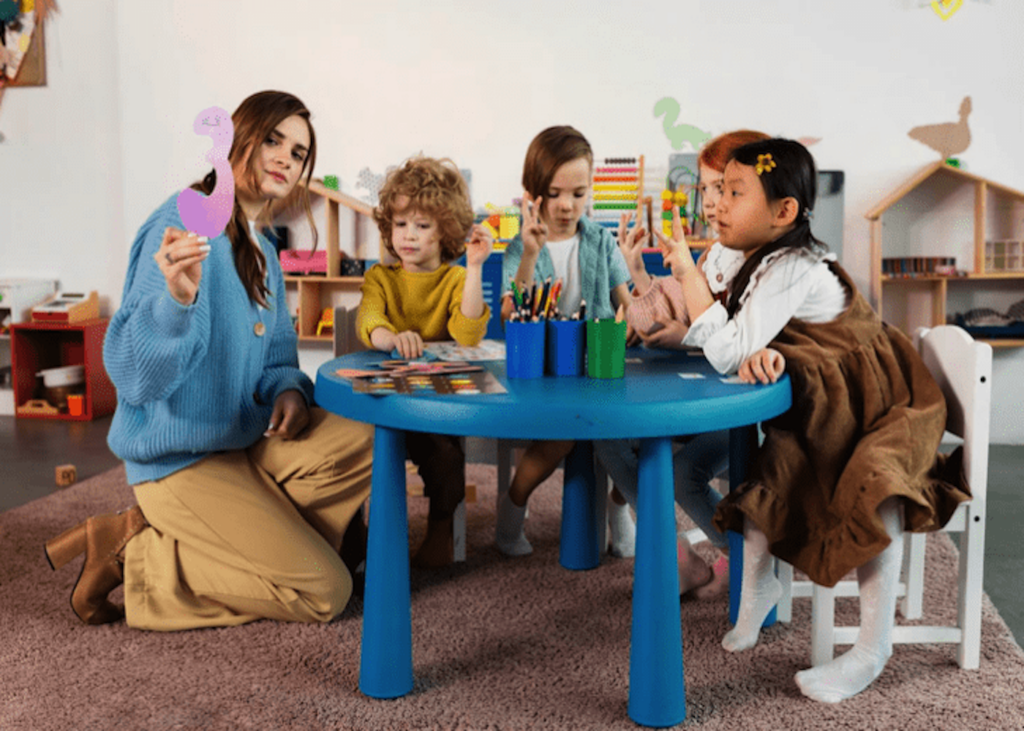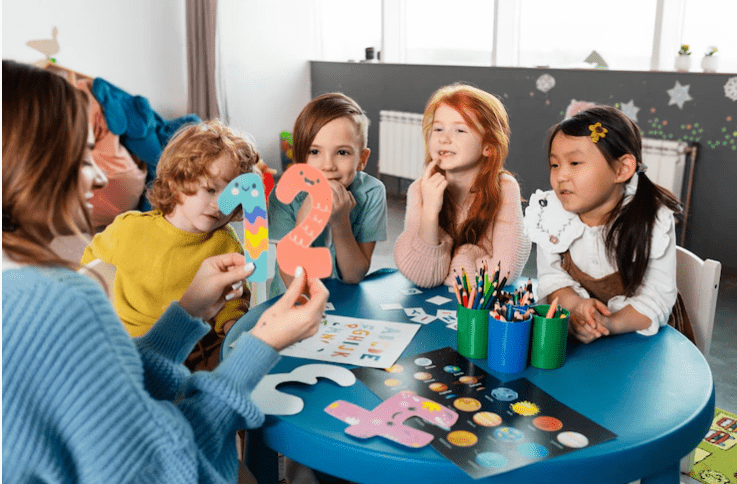Montessori education is becoming more popular each year as more parents choose this system over the traditional method of teaching. Montessori schools focus on the individual child and their abilities and interests rather than forcing children into a mold that doesn’t fit them.
This blog post will discuss the benefits of Montessori vs. traditional education and why more parents are choosing Montessori for their children.
What is the Montessori method?
Montessori (or the Montessori Method) is an educational approach based on the philosophy of Dr. Maria Montessori, which emphasizes a child’s natural ability to learn. Maria was an Italian physician who developed her educational philosophy in the early 1900s and opened the first Montessori school (the “Casa Dei Bambini” or “Children’s House”) in 1907.
To learn more about Maria and the development of this educational method, you can read the article by the American Montessori Society here.
The Montessori method emphasizes independence, freedom within limits, and respect for a child’s natural psychological development. This allows children to develop in a holistic manner.
Montessori classrooms
In the classroom, children are free to move about and choose their activities from various interest centers while exploring specially designed learning materials. There are three essential elements of Montessori:
- a prepared environment,
- a trained teacher, and
- observation
Environment
The prepared environment refers to the classrooms and materials designed specifically to meet the needs of children in different stages of development. Montessori students enjoy a seemingly minimalist classroom where everything has a purpose.
Montessori teachers
The trained teacher is knowledgeable in the Montessori method and sensitive to each child’s individual needs.
Observation
Observation involves observing each child as they identify their interests, strengths, and weaknesses and providing them with appropriate learning experiences.
Montessori principles
The Montessori method of education offers a balance of freedom and structure. Children can explore and discover their world at their own pace, within developmentally appropriate limits set by the adults to ensure their safety and well-being. Also, Montessori education fosters social, emotional, physical, and cognitive development.
Montessori to education is based on the following principles:
- Children are naturally curious and have a desire to learn.
- All children have unique needs and abilities.
- Children learn best through direct experience with materials and their environment.
- The role of the teacher is to provide guidance and support, not to direct learning.
- Children should be allowed to work at their own pace.
- There should be opportunities for both individual and group work.
These principles are evident in a Montessori classroom, usually designed to promote exploration and discovery. Classroom activities are designed to be hands-on so children can learn through direct experience. Materials are often stored at the child’s level, and there is a lot of open space for movement, which may not always be the case in a conventional classroom.

Montessori schools vs. traditional schools
Though both Montessori and Traditional Methods of education have their pros and cons, there are critical differences between the two approaches.
Development
One of the most significant differences between the Montessori approach and traditional education is how each system views the child’s natural development.
Montessori teachers educate in a way that focuses on allowing the child to develop and learn at their own pace. In contrast, Traditional Method education has a more rigid approach, with specific milestones and academic skills outlined that a child is expected to hit at certain ages. This can lead to kids being left behind or pressured if they don’t meet the milestones.
Role of the teacher
Another key difference is in the role of the teacher. In a Montessori classroom, the teacher is more of a guide, helping children discover things for themselves. In the typical classroom, the teacher can play more of a lecturer-type role, sharing information with students in a one-way format.
That being said, as a current MA of Teaching student, I can confidently say that this is changing in public education. Not all traditional educators will prioritize lecture-style teaching. Many now favor collaboration and inquiry-based learning.
Learning styles
Montessori emphasizes hands-on learning, while the traditional method often focuses more on memorization and rote learning. This can make Montessori classrooms feel more relaxed and fun but may lack the rigor that some parents prefer.
At the end of the day, speaking with the schools you are considering is the most definitive way to ensure they offer what you seek for your child’s education! While both approaches have their merits, it’s essential to consider which one will be a better fit for your child’s individual needs. It is also important to note that no two educators are the same, so the exact style of teaching your child receives will depend on their teacher.
Benefits of Montessori education
Individualized learning
There are many benefits of Montessori education, including the fact that it is individualized and tailored to meet the needs of each child. In a Montessori classroom, children are encouraged to work at their own pace and move freely around the room to explore the materials. This allows each child to learn in a way best suited to their learning style. A strong Montessori educator will be proficient at understanding your individual child’s needs and supporting them through their learning.
Hands-on learning
Additionally, Montessori emphasizes hands-on learning, which helps children to understand better and retain information. Furthermore, classrooms typically have a low teacher-to-student ratio, which allows for more individualized attention and support.
Independence
Finally, Montessori fosters independence, self-motivation, and a love of learning in its students. These factors combine to create an optimal learning environment that can benefit all children.
Why parents are choosing Montessori for their children
One of the main reasons that parents are choosing Montessori classrooms for their children is that they offer a much more individualized and personalized approach to education than traditional schools. In the classroom, each child can progress at their own pace, and teachers provide customized instruction based on each child’s unique needs and interests. This approach is highly effective in helping children learn and retain information.
Additionally, Montessori strongly emphasizes developing independent thinking skills and encouraging creativity. For many parents, these are essential qualities they want their children to nurture and grow.
Finally, as mentioned above, Montessori typically offers small class sizes, which allows for more one-on-one interaction between teachers and students. This creates a more intimate learning environment where everyone feels comfortable and supported. All of these factors combined make this style of learning an attractive option for an increasing number of parents.
Montessori curriculum
If you would like to get an idea of what the Montessori program looks like, I would suggest checking this post out from the Montessori Academy. In that article, you can learn about the Montessori philosophy, Montessori educators, and their 5 curriculum areas.
The five areas covered by Montessori programs are:
- Practical life skills (including social skills)
- Sensory development
- Mathematics education (read more about this here)
- Language
- Culture
A Montessori teacher is trained to deliver all strands of the above curriculum in a way that aligns with the educational theory outlined by Maria Montessori.
If you’re curious about public Montessori schools in your area, you could look on the American Montessori Society website (linked here). Alternatively, if you’re in Canada, you could look at the Canadian Council of Montessori Administrator’s school finder (here).
Conclusion
Parents are choosing Montessori education for their children over the traditional method for various reasons. While the conventional practice often focuses on lectures and rote learning, Montessori emphasizes creative thinking and independent learning.
In addition, Montessori classrooms are designed to be stimulating and engaging, with plenty of opportunities for hands-on exploration, whereas traditional classrooms follow stricter routines and schedules.
Furthermore, students typically progress at their own pace, allowing them to move on to more challenging material when they are ready. This individualized approach has proven to be very successful in preparing children for the real world.
Are you still wondering if you should consider Montessori for your little one’s early childhood education? Give this a read: Montessori Education, is it Right for You?


Leave a Reply